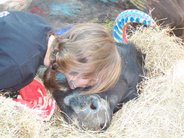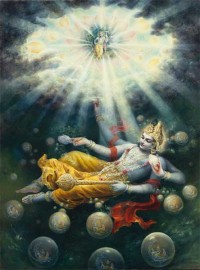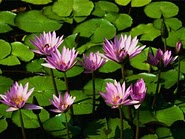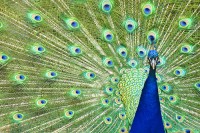By Kate Wilson, The New York Times
A few months after Lloyd reported on the Swiss government’s conclusion that plants have rights, the Ecuadorian population went one step further and voted to change their constitution to proclaim that nature has “the right to the maintenance and regeneration of its vital cycles, structure, functions and evolutionary processes.”
The New York Times felt that the Ecuadorian concept of plants’ rights was significant enough to include it in their 8th Annual Year in Ideas list. Enquire further to find out what this could mean for conservation efforts in the South American nation.
The precise scope of nature’s rights is unclear. Referring to Pachamama, an indigenous deity whose name roughly translates as “Mother Universe,” the text puts less emphasis on defending specific species than on the rights of ecosystems writ large. And it is uncertain how, exactly, a country as poor as Ecuador can protect those rights — though observers expect to see a raft of new lawsuits against oil and gas companies.
As Risen notes, it remains to be seen if ecosystems will become protected because of the constitutional changes, but what is clear is that the local population thinks it’s worth a try. Almost 70% of Ecuadorians voted in favor of protecting nature in this method.
Ecuador drafted the changes with the help of the U.S. based Community Environmental Legal Defense Fund. Along with it’s work in Ecuador, the Fund “has assisted more than a dozen local municipalities with drafting and adopting local laws recognizing Rights of Nature.” The basis of these rights “change the status of ecosystems from being regarded as property under the law to being recognized as rights-bearing entities.”
With a world economy, partially-based on the sanctity of property rights, in a nosedive it’s possible that radical ideas like this will take hold. We’ll watch with cautious optimism that other nations will follow the Ecuadorian lead to respect and protect our interconnected planet.
Filed under: Vedic Ecology

“The wind carries the clouds to different parts of the globe, and the clouds distribute rains, to the satisfaction of the people in general, just as rich kings and merchants distribute their accumulated wealth, inspired by religious priests.”
–Light of the Bhagavata, Verse 21
(c) The Bhaktivedanta Book Trust International, Inc.
Filed under: Vedic Ecology

“Fierce torrents of rain break over the strands and the partition walls of the paddy field. These disturbances resemble those created by the seasonal opponents of the standard principles of the Vedas, who are influenced by the age of Kali.”
–Light of the Bhagavata, Verse 20
(c) The Bhaktivedanta Book Trust International, Inc.

Among those who see the need for fundamental change in human consciousness are the deep ecologists. “Deep ecology is a process of ever-deeper questioning of ourselves, the assumptions of the dominant worldview of our culture, and the meaning and truth of our reality,” say two prominent theorists of this movement, Bill Devall and George Sessions.
We agree with the deep sociologists that modern civilization raises obstacles to this process of inquiry. “In technocratic industrial societies there is overwhelming propaganda and advertising which encourages false needs and destructive desires designed to foster increased production and consumption of goods,” say Devall and Sessions. “Most of this actually diverts us from facing reality in an objective way and from beginning the ‘real work’ of spiritual growth and maturity.”
Deep ecologists would like to see much of the world returned to wilderness. They also speak of the “biocentic equality” of all living things. By this they mean that “all things in the biosphere have an equal right to live and blossom and to reach their own individual forms of unfolding and self-realization within the larger self-realization.”
Members of the International Society for Krishna Consciousness, while sympathetic to some of the goals of the deep ecologists, differ with them about the ultimate sense in which all creatures “reach their own individual forms of unfolding and self-realization within the larger Self-realization.” For the deep ecologists, this process takes place solely within nature. The “larger Self-realization” is simply that of nature unfolding according to its own laws. As far as humanity’s self-realization is concerned, this would amount to humans as a species taking a more humble position relative to nature and other living things. But this holistic vision, although an improvement over humanity’s present exploitive behavior toward nature and other living beings, falls short of a genuine spirituality. It fails to take in account the eternal identities of all living things beyond their situation in material nature. These eternal identities become revealed not simply in relation to nature and other living things but in relation to God, who is present both in nature and beyond nature and who is the source of both nature and the living things in nature.
An equality of vision more satisfactory than that of the deep ecologists was possessed by the ancient sages of India, whose teachings the members of the modern Krsna consciousness movement follow.
“The humble sages, by virtue of true knowledge, see with equal vision a learned and gentle brahmana, a cow, an elephant, a dog, and a dog-eater [outcaste],” says the Bhagavad Gita (5.19).
A Krsna conscious person does not make any distinction between species or castes,” comments Srila Prabhupada on this text in his Bhagavad Gita As It Is. “The brahmana and the outcaste may be different from the social point of view, or a dog, a cow, and an elephant may be different from a species point of view, but these differences are meaningless to the learned transcendentalist. This is due to their relationship with the Supreme.”
Each living thing is not simply a material form that finds its proper place within material nature. Each living thing is also possessed of a soul, which has an eternal relationship with God , who exists beyond material nature. Of course, nature is the energy of God, and God is present in His energy as well as beyond it. So it is possible for those who properly align their souls with God and with the souls of other living things to also properly align their material bodies with God’s material nature and the material bodies of other living things. This is a more complete self-realization than that of deep ecology.
Applying a vision of the theocentric equality of all living things, the International Society for Krishna Consciousness addresses the deep philosophical and spiritual issues that touch on the self and nature, while it simultaneously introduces a way of life that situates the self harmoniously within nature.
-excerpt from Divine Nature by Micheal A. Cremo and Mukunda Goswami
Filed under: Vedic Ecology

“A crane stands on the edge of a pond that is always disturbed by flowing water, mud, and stones. The crane is like a householder who is disturbed in the shelter of his home but who, because of too much attachment, does not want to change his position.”
–Light of the Bhagavata, Verse 19
(c) The Bhaktivedanta Book Trust International, Inc.
Filed under: Vedic Ecology

“Many plants and creepers that were almost dead during the months of April and May are now visible again in various forms, for they are nourished by their roots in the moist earth. These numberless plants and creepers resemble persons who dry up in severe penances for some material gain but then achieve their objectives and become luxuriously fat, nourished by sense enjoyment.”
–Light of the Bhagavata, Verse 18
Filed under: Vedic Ecology
“When the clouds appear in the sky the peacock begins to dance in ecstasy, as a sincere soul becomes overwhelmed with joy on the appearance of a saint at his house.”
–Light of the Bhagavata, Verse 17
Filed under: Vedic Ecology

“Just as the first glimpse of offenseless chanting clears up all the fog and doubts in the heart, so the first rays of dawn awaken the different species of the dhama. The first song of the waking birds heralds the beginning of a new day, a new life, in the service of the Lord.
As the dawn approaches, the birds first awaken and by their song proclaim throughout the land that the day has begun. As others emerge from their slumber in response to the birdsong, all living entities manifest their particular manner of serving the Lord. Those who are birds begin their new day by singging. In time they will manifest their true dharma and will even fly.
There is only one true flight from this material world. It is not an escape from suffering and conflict, but rather an ascension to beyond this world of pain. The dawn gives us a clue to the awakening of the soul.
The dawning of reality is marked by the appearance of the eternal song of love, the maha-mantra, who has descended from Goloka-dhama to shine in the sky of the heart of all beings. As the first dim glimmer of the Name grows nigh, all fog and confusion dissipate from the heart.”
-HH Varsana Swami
Filed under: Vedic Ecology

“At night, by the grace of the moonlight, the clouds in the sky can be seen moving. Yet the moon itself also appears to be moving, just as a living being appears to be moving because of false identification with matter.”-Light of the Bhagavata, Verse 16
Filed under: Vedic Ecology

“The lightning becomes unsteady in its friendship, failing to remain faithfully in any one of the clouds, although they are the friends of the entire world, just as lusty women do not remain steady even in the company of men who possess excellent qualities.”-The Light of the Bhagavata, Verse 14
 "We do not condemn modern civilization but we don't like to get it at the cost of God Consciousness, that is suicide."
__________________________________
The Beauty of Beans
"We do not condemn modern civilization but we don't like to get it at the cost of God Consciousness, that is suicide."
__________________________________
The Beauty of Beans
 "One acre of beans produces ten times more protein than an acre of pasture set aside for meat production." -Higher Taste
"One acre of beans produces ten times more protein than an acre of pasture set aside for meat production." -Higher Taste
 Moundsville, West Virginia
_________________________________
ISKCON Gita Nagari Farm Community
Moundsville, West Virginia
_________________________________
ISKCON Gita Nagari Farm Community
 Port Royal, Pennsylvania
_________________________________
ISKCON New Goloka Farm Community
Port Royal, Pennsylvania
_________________________________
ISKCON New Goloka Farm Community
 Hillsborough, North Carolina
_________________________________
ISKCON New Talavan Farm Community
Hillsborough, North Carolina
_________________________________
ISKCON New Talavan Farm Community
 Carriere, Mississippi
_________________________________
ISKCON Saranagati Eco-Village
Carriere, Mississippi
_________________________________
ISKCON Saranagati Eco-Village
 British Columbia, Canada
_______________________________
ISKCON Gaura Vrindaban
British Columbia, Canada
_______________________________
ISKCON Gaura Vrindaban
 Paraty, Brazil
_________________________________
ISKCON Krishna Valley Farm Community
Paraty, Brazil
_________________________________
ISKCON Krishna Valley Farm Community
 Somogyvamos, Hungary
_________________________________
Bhaktivedanta Eco-Village
Somogyvamos, Hungary
_________________________________
Bhaktivedanta Eco-Village
 Sagar Taluq, South India
_________________________________
ISKCON Cow Protection
Sagar Taluq, South India
_________________________________
ISKCON Cow Protection
 "There are so many facilities afforded by cow protection, but people have forgotten these arts. The importance of protecting cows is therefore stressed by Krsna in Bhagavad-gita (krsi-go-raksya-vanijyam vaisya-karma svabhavajam [Bg. 18.44]). Even now in the Indian villages surrounding Vrndavana, the villagers live happily simply by giving protection to the cow. They keep cow dung very carefully and dry it to use as fuel. They keep a sufficient stock of grains, and because of giving protection to the cows, they have sufficient milk and milk products to solve all economic problems. Simply by giving protection to the cow, the villagers live so peacefully. Even the urine and stool of cows have medicinal value."
-Srila Prabhupada
_________________________________
"There are so many facilities afforded by cow protection, but people have forgotten these arts. The importance of protecting cows is therefore stressed by Krsna in Bhagavad-gita (krsi-go-raksya-vanijyam vaisya-karma svabhavajam [Bg. 18.44]). Even now in the Indian villages surrounding Vrndavana, the villagers live happily simply by giving protection to the cow. They keep cow dung very carefully and dry it to use as fuel. They keep a sufficient stock of grains, and because of giving protection to the cows, they have sufficient milk and milk products to solve all economic problems. Simply by giving protection to the cow, the villagers live so peacefully. Even the urine and stool of cows have medicinal value."
-Srila Prabhupada
_________________________________
 "The Personality of Godhead is perfect and complete, and because He is completely perfect, all emanations from Him, such as this phenomenal world, are perfectly equipped as complete wholes. Whatever is produced of the Complete Whole is also complete in itself. Because He is the Complete Whole, even though so many complete units emanate from Him, He remains the complete balance."
_________________________________
MANTRA ONE
"The Personality of Godhead is perfect and complete, and because He is completely perfect, all emanations from Him, such as this phenomenal world, are perfectly equipped as complete wholes. Whatever is produced of the Complete Whole is also complete in itself. Because He is the Complete Whole, even though so many complete units emanate from Him, He remains the complete balance."
_________________________________
MANTRA ONE
 "Everything animate or inanimate that is within the universe is controlled and owned by the Lord. One should therefore accept only those things necessary for himself, which are set aside as his quota, and one should not accept other things, knowing well to whom they belong."
_________________________________
MANTRA TWO
"Everything animate or inanimate that is within the universe is controlled and owned by the Lord. One should therefore accept only those things necessary for himself, which are set aside as his quota, and one should not accept other things, knowing well to whom they belong."
_________________________________
MANTRA TWO
 "One may aspire to live for hundreds of years if he continuously goes on working in that way, for that sort of work will not bind him to the law of karma. There is no alternative to this way for man."
_________________________________
MANTRA THREE
"One may aspire to live for hundreds of years if he continuously goes on working in that way, for that sort of work will not bind him to the law of karma. There is no alternative to this way for man."
_________________________________
MANTRA THREE
 "The killer of the soul, whoever he may be, must enter into the planets known as the worlds of the faithless, full of darkness and ignorance."
_________________________________
MANTRA FOUR
"The killer of the soul, whoever he may be, must enter into the planets known as the worlds of the faithless, full of darkness and ignorance."
_________________________________
MANTRA FOUR
 "Although fixed in His abode, the Personality of Godhead is swifter than the mind and can overcome all others running. The powerful demigods cannot approach Him. Although in one place, He controls those who supply the air and rain. He surpasses all in excellence."
_________________________________
MANTRA FIVE
"Although fixed in His abode, the Personality of Godhead is swifter than the mind and can overcome all others running. The powerful demigods cannot approach Him. Although in one place, He controls those who supply the air and rain. He surpasses all in excellence."
_________________________________
MANTRA FIVE
 "The Supreme Lord walks and does not walk. He is far away, but He is very near as well. He is within everything, and yet He is outside of everything."
_________________________________
MANTRA SIX
"The Supreme Lord walks and does not walk. He is far away, but He is very near as well. He is within everything, and yet He is outside of everything."
_________________________________
MANTRA SIX
 "He who sees everything in relation to the Supreme Lord, who sees all living entities as His parts and parcels, and who sees the Supreme Lord within everything never hates anything or any being."
_________________________________
MANTRA SEVEN
"He who sees everything in relation to the Supreme Lord, who sees all living entities as His parts and parcels, and who sees the Supreme Lord within everything never hates anything or any being."
_________________________________
MANTRA SEVEN
 "One who always sees all living entities as spiritual sparks, in quality one with the Lord, becomes a true knower of things. What, then, can be illusion or anxiety for him?"
_________________________________
MANTRA EIGHT
"One who always sees all living entities as spiritual sparks, in quality one with the Lord, becomes a true knower of things. What, then, can be illusion or anxiety for him?"
_________________________________
MANTRA EIGHT
 "Such a person must factually know the greatest of all, the Personality of Godhead, who is unembodied, omniscient, beyond reproach, without veins, pure and uncontaminated, the self-sufficient philosopher who has been fulfilling everyone's desire since time immemorial."
_________________________________
MANTRA NINE
"Such a person must factually know the greatest of all, the Personality of Godhead, who is unembodied, omniscient, beyond reproach, without veins, pure and uncontaminated, the self-sufficient philosopher who has been fulfilling everyone's desire since time immemorial."
_________________________________
MANTRA NINE
 "Those who engage in the culture of nescient activities shall enter into the darkest region of ignorance. Worse still are those engaged in the culture of so-called knowledge."
_________________________________
MANTRA TEN
"Those who engage in the culture of nescient activities shall enter into the darkest region of ignorance. Worse still are those engaged in the culture of so-called knowledge."
_________________________________
MANTRA TEN
 "The wise have explained that one result is derived from the culture of knowledge and that a different result is obtained from the culture of nescience."
_________________________________
MANTRA ELEVEN
"The wise have explained that one result is derived from the culture of knowledge and that a different result is obtained from the culture of nescience."
_________________________________
MANTRA ELEVEN
 "Only one who can learn the process of nescience and that of transcendental knowledge side by side can transcend the influence of repeated birth and death and enjoy the full blessings of immortality."
_________________________________
MANTRA TWELVE
"Only one who can learn the process of nescience and that of transcendental knowledge side by side can transcend the influence of repeated birth and death and enjoy the full blessings of immortality."
_________________________________
MANTRA TWELVE
 "Those who are engaged in the worship of demigods enter into the darkest region of ignorance, and still more so do the worshipers of the impersonal Absolute."
_________________________________
MANTRA THIRTEEN
"Those who are engaged in the worship of demigods enter into the darkest region of ignorance, and still more so do the worshipers of the impersonal Absolute."
_________________________________
MANTRA THIRTEEN
 "It is said that one result is obtained by worshiping the supreme cause of all causes and that another result is obtained by worshiping what is not supreme. All this is heard from the undisturbed authorities, who clearly explained it."
_________________________________
MANTRA FOURTEEN
"It is said that one result is obtained by worshiping the supreme cause of all causes and that another result is obtained by worshiping what is not supreme. All this is heard from the undisturbed authorities, who clearly explained it."
_________________________________
MANTRA FOURTEEN
 "One should know perfectly the Personality of Godhead Śrī Kṛṣṇa and His transcendental name, form, qualities and pastimes, as well as the temporary material creation with its temporary demigods, men and animals. When one knows these, he surpasses death and the ephemeral cosmic manifestation with it, and in the eternal kingdom of God he enjoys his eternal life of bliss and knowledge."
_________________________________
MANTRA FIFTEEN
"One should know perfectly the Personality of Godhead Śrī Kṛṣṇa and His transcendental name, form, qualities and pastimes, as well as the temporary material creation with its temporary demigods, men and animals. When one knows these, he surpasses death and the ephemeral cosmic manifestation with it, and in the eternal kingdom of God he enjoys his eternal life of bliss and knowledge."
_________________________________
MANTRA FIFTEEN
 "O my Lord, sustainer of all that lives, Your real face is covered by Your dazzling effulgence. Kindly remove that covering and exhibit Yourself to Your pure devotee."
_________________________________
MANTRA SIXTEEN
"O my Lord, sustainer of all that lives, Your real face is covered by Your dazzling effulgence. Kindly remove that covering and exhibit Yourself to Your pure devotee."
_________________________________
MANTRA SIXTEEN
 "O my Lord, O primeval philosopher, maintainer of the universe, O regulating principle, destination of the pure devotees, well-wisher of the progenitors of mankind, please remove the effulgence of Your transcendental rays so that I can see Your form of bliss. You are the eternal Supreme Personality of Godhead, like unto the sun, as am I."
_________________________________
MANTRA SEVENTEEN
"O my Lord, O primeval philosopher, maintainer of the universe, O regulating principle, destination of the pure devotees, well-wisher of the progenitors of mankind, please remove the effulgence of Your transcendental rays so that I can see Your form of bliss. You are the eternal Supreme Personality of Godhead, like unto the sun, as am I."
_________________________________
MANTRA SEVENTEEN
 "Let this temporary body be burnt to ashes, and let the air of life be merged with the totality of air. Now, O my Lord, please remember all my sacrifices, and because You are the ultimate beneficiary, please remember all that I have done for You."
_________________________________
MANTRA EIGHTEEN
"Let this temporary body be burnt to ashes, and let the air of life be merged with the totality of air. Now, O my Lord, please remember all my sacrifices, and because You are the ultimate beneficiary, please remember all that I have done for You."
_________________________________
MANTRA EIGHTEEN
 "O my Lord, as powerful as fire, O omnipotent one, now I offer You all obeisances, falling on the ground at Your feet. O my Lord, please lead me on the right path to reach You, and since You know all that I have done in the past, please free me from the reactions to my past sins so that there will be no hindrance to my progress."
"O my Lord, as powerful as fire, O omnipotent one, now I offer You all obeisances, falling on the ground at Your feet. O my Lord, please lead me on the right path to reach You, and since You know all that I have done in the past, please free me from the reactions to my past sins so that there will be no hindrance to my progress."
